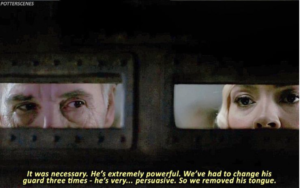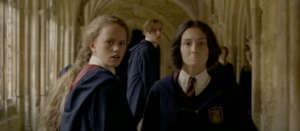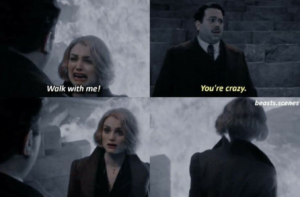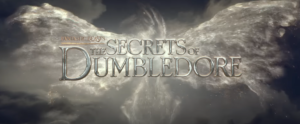How the Power of Speech Defines “The Crimes of Grindelwald”
It seems safe to say that Fantastic Beasts: The Crimes of Grindelwald is pretty much the reason we are where we are today. Wouldn’t you say? After the first Fantastic Beasts movie, things were running smoothly. Then Crimes of Grindelwald came out and a lot of people hated it, and around the same, the bad press started coming in surrounding J.K. Rowling’s comments, the Johnny Depp casting, and Ezra Miller’s legal troubles. Now, after the third Fantastic Beasts movie, it’s basically a foregone conclusion that the series will meet an early end.
Which is a shame. Because the second film is much better than it’s given credit for, and its story deserves to continue.
Here’s the thing about Crimes of Grindelwald: it’s an incredibly focused movie. It knows exactly what it’s about. You see this throughout the original Potter series: Harry Potter and the Order of the Phoenix, for instance, is laser-focused on the power of dissent. In well-executed, focused narratives like this, you can just tell that the author is in command; they know exactly what they’re doing and what role each element plays.
Crimes of Grindelwald is all about the power of speech.
It’s evident from the beginning when government officials visit Grindelwald’s cell before his extradition to Europe. “He was very persuasive,” President Seraphina Picquery says. “So we removed his tongue.” We’re told right away: that Grindelwald’s power is his speech.

Then Jacob and Queenie visit Newt, but their trip devolves into a fight when Newt lifts the enchantment under which Queenie is holding Jacob. Jacob chases Queenie out into the street. They begin arguing; Queenie calls Jacob a coward.
“If I’m a coward, then you’re…” he says.
“Crazy?” Queenie responds.
“I didn’t say it,” Jacob says.
“You didn’t have to,” Queenie answers.
Queenie, in other words, says that the speech – the use of the mouth to form the words – isn’t the problem, so much as the underlying thought. But she’ll soon realize that she’s wrong.
Throughout the film, speech keeps popping up. There’s the flashback to Leta’s time at Hogwarts when she hears a fellow student insulting the Lestrange family and curses her mouth shut. Leta can’t stop the thought behind the insults, but she can stop the words themselves.

Meanwhile, Queenie slowly but surely makes her turn toward Grindelwald, culminating when – what else? – he finally gets to speak to her. In the climactic scene, Grindelwald wins over his audience by giving a speech, and we see when the Aurors show up that their blunt force isn’t going to win any arguments when compared to Grindelwald’s rhetorical skill.
But what ultimately drives Queenie over the edge? She’s begging Jacob to join Grindelwald, and this time, he says it.
“You’re crazy!”
And Queenie loses her last vestige of uncertainty and fully embraces the dark side. There, in a nutshell, is the argument of the movie: words not spoken can only do so much, but speech can cause fundamental change. The entire movie is the story of Jacob going from thinking “you’re crazy” – an impulsive, momentary thought – to saying “you’re crazy” – a resigned, firmly-held belief.

Now, just because the movie has well-executed things to say about the power of speech doesn’t mean it was entertaining or thrilling. Some thought it was; some didn’t; it is what it is. But what it does mean is that J.K. Rowling, fundamentally, was commanding the material. She knew what she was doing. Everything was going somewhere.
But then came the bad reviews and the sinking box office, and the studio panicked. So they reworked the story, and abruptly either resolved or ignored most of the plot elements introduced in Crimes of Grindelwald.
Crimes of Grindelwald, at its core, was a smart movie. Everything was there for a reason. The prophecy of Tycho Dodonus was going somewhere. Credence’s true identity was going to mean something. Nagini was going to be important. We were going to see how Corvus Lestrange survived drowning (and he did survive because the Lestrange name survived). Maybe he returned, just throwing this out there, as a great avenger, with wings from the water?

The whole Fantastic Beasts story was going to come together in a mind-blowing, amazing way that filled in all the details and made everything make sense. But now it won’t. Instead, we got Secrets of Dumbledore, which – though a fantastic movie on its own – basically scratched out the second film and started over. Credence no longer matters; by the end, he’s dying or dead. The prophecy is forgotten. The Lestrange family and Nagini might as well not exist.
And now, we’ll never know their stories. All these intriguing, wide-open plot points are gone, likely never to be resolved. And all because everyone panicked after Crimes of Grindelwald – a movie that, for all its faults, promised a lot to come that now never will.

